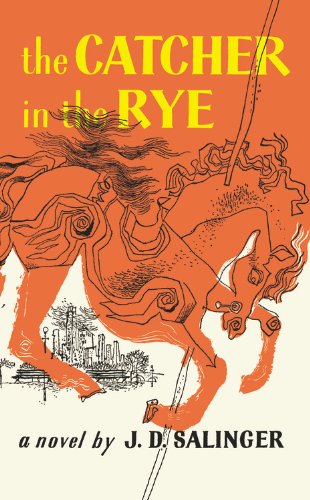All Nonfiction
- Bullying
- Books
- Academic
- Author Interviews
- Celebrity interviews
- College Articles
- College Essays
- Educator of the Year
- Heroes
- Interviews
- Memoir
- Personal Experience
- Sports
- Travel & Culture
All Opinions
- Bullying
- Current Events / Politics
- Discrimination
- Drugs / Alcohol / Smoking
- Entertainment / Celebrities
- Environment
- Love / Relationships
- Movies / Music / TV
- Pop Culture / Trends
- School / College
- Social Issues / Civics
- Spirituality / Religion
- Sports / Hobbies
All Hot Topics
- Bullying
- Community Service
- Environment
- Health
- Letters to the Editor
- Pride & Prejudice
- What Matters
- Back
Summer Guide
- Program Links
- Program Reviews
- Back
College Guide
- College Links
- College Reviews
- College Essays
- College Articles
- Back
The Catcher in the Rye by J.D. Salinger
Imagine the ideal book for the high school English curriculum that would appeal to both teachers and students. Teachers crave a book that includes many subtle symbols and various literary elements, which would lead to active engagement and hold insightful discussions. Students, on the other hand, enjoy indulging in entertaining novels that captivate and entertain them, often with a relatable, witty main character that's put into situations that students can sympathize with. The good news is that this book is already on the current English curriculum - The Catcher in the Rye by J.D. Saligner.
The Catcher in the Rye is a geyser, overflowing with themes and underlying tones. From the very start of the novel, the story already creates interesting and notable word play with several of the main characters' names. For example, the protagonist's name, Holden Caulfield, can be broken down to the words "hold in", "caul", and "field", which references to the title of the book, specifically "Catcher" and "Rye"(field). Another example is Robert Ackely, Holden's previous roommate. Ackley is described to be covered in acne , a similar sounding word to his surname. Furthermore, the novel also uses words that initially seem insignificant, but actually carry deeper meanings that are revealed near the end of the book. For example, Holden feels as though he is "falling" throughout the book. While "falling" as an adjective may not seem relevant initially, the true significance is revealed when Mr. Antolini, Holden's old teacher, warns Holden that he may be trapped in a never-ending fall, referring to his current mental state of mind and behavior. More importantly, the novel also uses subtle symbols and other nuances that teachers can use to create provocative and stimulating discussions with their students.
Holden's morals on honesty are still relevant to each generation, in their own way. The Catcher in the Rye is told from Holden Caulfield's perspective. As such, he constantly mentioned his values, specifically honesty and purity. Holden absolutely detests dishonesty and often refers to people as "phonies". Ironically, even though The Catcher in the Rye was published in 1951, more than 50 years ago, many of the Holden's values, especially "phoniness", are still very relevant and timely, especially in today's generation. These examples are mostly found in pop culture, although many critics also argue that a "phony" is currently in charge of the United States! They say politicians make promises, but that these promises are "like babies: easy to make, hard to deliver." Holden would probably be appalled that "phonies" have not only continued to spread towards adults, but also affected teenagers in our generation, especially celebrities such as Miley Cyrus.
A notable argument against The Catcher in the Rye is that the story itself is very dry as most of the book revolves around Holden's thoughts. Patrick Welsh's English students criticized the book, saying that it is "random" and that "there is no real plot." However, the lack of "real plot" makes this story much more realistic. Life does not have a plot. Similarly, Holden's story isn't about what happens to him throughout the book; rather, it's about how he changed throughout his journey of trying to find himself. Initially, many of Holden's thoughts are in a melancholy tone, filled with negativity and remorse. Throughout the novel, Holden struggles to search for hope after suffering the grief and misgivings of losing his younger brother. He attempts to find comfort by finding "escape" from his life, consulting with several people, and finally finds peace with himself after a day with his sister. In the final chapter, Holden doesn't have a clear ideal "happy end", and his future is still unknown. However, he now feels more optimistic for the future, which makes Holden very relatable because in real life, a positive mentality for the future is the closest to a happy end. As Charles R. Swindoll said, "Life is 10% what happens to you and 90% how you react to it."
Holden perfectly sums up a reader's thoughts about finishing a great book when he says, "What really knocks me out is a book that, when you're all done reading it, you wish the author that wrote it was a terrific friend of yours and you could call him up on the phone whenever you felt like it. That doesn't happen much, though." Reading The Catcher in the Rye will leave many more readers feeling the same way while enlightening, empowering, and enriching them with Holden Caulfield's journey.
Similar Articles
JOIN THE DISCUSSION
This article has 0 comments.


When we were asked if The Catcher in the Rye should continue to be included in the English curriculm, this was my responce.